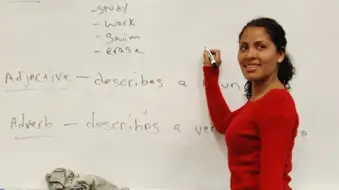There are those on both sides: grammar-philes and grammar-phobes.
I, myself, am one of the lovers- I was diagramming sentences for fun when I was eight- and I found it very hard to believe when someone first told me that students don’t need explicit grammar teaching. I was horrified at the idea! I prided myself in my excellent grammar teaching skills and found that my English classes were often centered around a grammatical concept. To say that students didn’t need to learn grammar rules or study verb charts seemed absurd. This hit me hard. In fact, you could even say I went through the five stages of grief: denial, anger, bargaining, depression… and acceptance. And when the acceptance came, it was like an epiphany.
It happened very suddenly. I was speaking Spanish around the house with my husband (who formally studied the language), and I realized how easily it came to me. In fact, the things I can say in Spanish come as easily and naturally to me as in English. How could this be? I’d never studied Spanish at all, had never seen a verb chart, never written a sentence, and here I was answering questions and formulating sentences without painstakingly trying to remember where the adjective goes or the proper conjugation of the verb. When the realization hit, I think my mouth dropped open. Was this what it was like to learn in a communicative environment?
After I came to accept this method, it was then time to convince my students that this would be more beneficial for them too. My grammar-loving student, who always begged for grammar exercises, came to me with her homework of the traditional “fill-in-the-blank with the appropriate verb” exercises and was nearly in tears. “I thought I was doing so well, but this homework was impossible!” Sure enough, the answers she’d given were mostly wrong. Seeing her distress, I took the paper away and suggested we just talk for a few minutes. Using the same verb tense she was supposed to be practicing, I asked her questions and she responded—correctly. After a few minutes, I smiled and asked her if she realized what she was doing. Of course she didn’t, just like none of us native speakers of English realize what verb tense we’re using. We just do it, without mentally pouring over verb charts or conjugating verbs in our conscious brain. The student was shocked. “Why couldn’t I do the exercises right then?” she cried.
Believe it or not, it makes perfect sense. Filling in blanks just isn’t natural. You’re never talking to a friend using sentences that are pre-written and all you have to do is fill in the correct verb. You use the correct verb naturally because you’ve done it over and over again. If you’ve used the wrong form of the verb, you’ve no doubt even had someone like me promptly correct you, and eventually, you learn.
So is the consensus that grammar is the ugly stepsister? Not at all. Grammar still has a special, necessary place in second language acquisition, and good grammar is important. But does it need to feel like you’re learning grammar? Nope, not in the least. Just like a native English speaker probably can’t explain to you what a modal perfect verb is, but they know how to use it correctly, that’s all that an English language learner needs too.
-Wendy Carson, Language Training Coordinator


